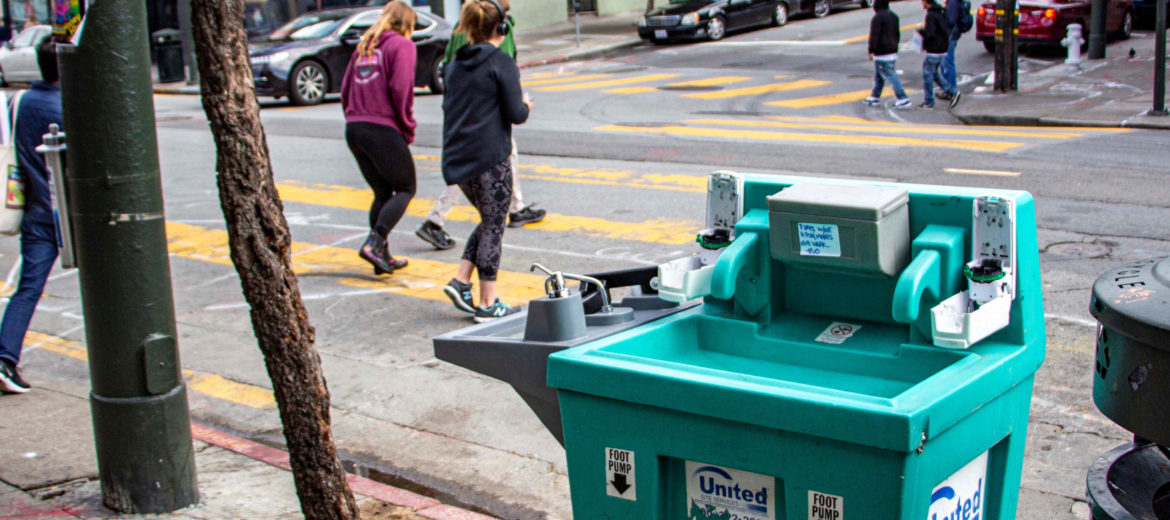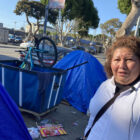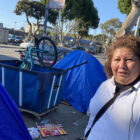In the early months of the pandemic, a San Francisco contractor in charge of supplying and servicing hygiene stations for homeless residents consistently failed to maintain the sites, despite repeated requests from staff at two city agencies that the company clean, fill or service them, according to dozens of emails between city staff and the contractor acquired by the San Francisco Public Press via public records request.
The contractor, United Site Services, left handwashing stations in homeless shelters empty for days at a time when shelters were still overcrowded with residents, even though the company’s invoices stated it would service the stations daily. In addition, staff at the shelters had called the company and emailed the Department of Homelessness and Supportive Housing asking station supplies be replenished, emails between the homelessness department and United show.
After the Public Works department took responsibility for the stations in April, problems with the company persisted. Department staffers complained regularly to United representatives about the company’s inability to maintain the handwashing stations and the portable toilets rolled out as part of the city’s PIT Stop program.
In a March 18 response to a series of photos of handwashing stations requiring maintenance, United national sales manager Rollin Kay told homelessness department staff to “keep on sending” pictures and updates. “They are keeping up as best they can,” he said.
Staff from both the homelessness department and public works often grew frustrated by the lack of follow-through from the company, repeatedly urging its representatives to do something about neglected stations.
In a March 19 email thread, several homelessness department employees discussed how to help Tanya Allen of Hamilton Families homeless shelter, who told the staffers that she had called United several times to report that the handwashing station at her shelter had leaked for days until it was empty. United staff hadn’t serviced the station since delivering it to the shelter four days prior, Allen’s email read.
When a department staff member said a city worker was on his way to inspect the station, Kendra Lorenz, lead clinical supervisor at the homeless outreach team, said it should be United workers who fix the issue, “as we’re paying them for daily servicing.”
Allen declined to comment without prior approval from the shelter’s media liaison, who did not reply to requests for comment in time for publication.
Later in March, John Ouertani, a site manager at homeless services group Episcopal Community Services, told homelessness department staff that the handwashing stations at Sanctuary and Next Door homeless shelters were “out of everything.”
“We will be there tomorrow to service for you,” Kay replied.
Three days later, Ouertani said nothing had changed. “They didn’t service both wash stations this weekend at all, I was up at Next Door and Sanctuary and noticed that they are still empty,” he said in an email to Kay and department staff.
“The City was aware of the problems with handwashing program early on and we worked closely with the vendor to ensure that problems were addressed,” said homelessness department spokeswoman Emily Cohen in an emailed statement.
“Under COVID-19 we are seeing unprecedented demand for handwashing stations, not just in San Francisco but around the region and we are working closely with the vendor to ensure that we have continued access to the resource and make progress in improving services,” she added.
New department, same messy problem
In April, when Public Works took charge of the handwashing stations and after it began rolling out extra portable toilets to neighborhoods with high concentrations of homeless residents, staff at the department began emailing United representatives asking why the portable toilets , which the company was contractually obliged to service daily, were not being maintained.
Darlene Frohm, a public works division manager, told United’s government account manager, Christin M. Ayres, in an April 16 email thread that the city would need to shut down the company’s portable toilets at San Francisco’s general hospital because United workers had not maintained them. She attached pictures of the toilets, full to the brim with excrement.
“I have received many texts stating that your drivers are not showing up for the daily service of these units and the photos, disgusting as they may be, this is what is happening,” Frohm said in the email. “Our staff states every day they must call to see what the ETA will be, and it takes a while. We would really appreciate some assistance with what and when we should expect service?”
In a May 8 email, Frohm contacted United representatives again to relay a text message she had received from a station attendant about three inoperable, solar-powered portable toilets in the Tenderloin, a neighborhood that has gained nationwide notoriety for its hundreds of homeless people living in squalid conditions during the pandemic.
“The Willow/Larkin Units are not working,” the text message included in Frohm’s email read. The United worker told the attendant he could not repair the trailer. “Your guy said he only does water not pumps or battery,” the email continued. “Please advise. We need support ASAP.”
The trailers remained broken for days, despite repeated emails from Frohm to United staff. Ayres responded, apologizing for the department’s difficulties with the trailers.
“Our team has done everything we can to keep these trailers running but apparently they can’t keep up with the usage,” Ayres said in her reply. “We have repaired, exchanged, replaced batteries etc… Have you thought about removing them and replacing with plastic toilets like the other 12 locations? This might be a better option. I think we are running out of ideas of how to keep them running properly with the 24/7 usage.”
A representative from public works deferred to spokeswoman Emily Cohen’s statement. Representatives from United Site Services did not reply to requests for comment in time for publication.
A history of neglect
Two San Francisco Public Press investigations — one in March and the second in May — of hygiene stations operated by United under the direction of the homelessness department and public works found many of the hygiene stations to be broken, dirty, empty or missing entirely.
The first investigation found that four handwashing stations rolled out by the homelessness department were missing from their marked locations and a third of the stations lacked soap or had clogged sink basins.
The second investigation found that 43% of the portable toilets and handwashing stations were missing at least one element essential to handwashing, such as soap, water or paper towels. Two employees of Urban Alchemy, one of the companies charged with staffing the portable toilets, told the Public Press in May that they sometimes had to wait hours for United employees to restock the stations with toilet paper or soap, leaving the toilets unusable in the meantime. The employees refused to share their names, saying they could be fired for speaking to media representatives.
Kelley Cutler, an organizer at the Coalition on Homelessness, said “it’s really not surprising” that United failed to maintain the stations, or that city staff had grown frustrated with the company. But the poorly maintained stations were only one of many signs of neglect among the homeless community during the pandemic, another being the unfair reputation lumped on unhoused people.
“So often, people are getting demonized for defecating in the street when, once again, there aren’t adequate services being provided for people,” she said, adding that she acknowledged the challenge of maintaining such heavily used facilities faced by United staff. “It’s hard — but figure it out.”










